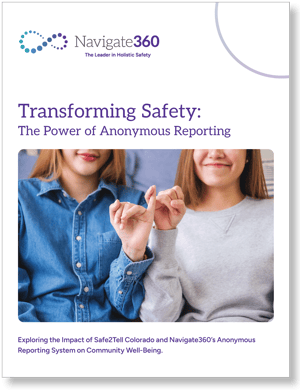From Tips to Action: How Safe2Tell Colorado Strengthens School Safety Statewide
Students can't learn if they don't feel safe. Yet in too many schools, warning signs go unreported—either because students don't know where to turn, or they fear retaliation. Anonymous reporting changes that. It gives students, staff, and community members a trusted way to share concerns early, allowing schools to act before situations escalate.
Learn how Safe2Tell Colorado, serving more than 883,000 students, partnered with Navigate360 to create a statewide safety net. Discover how they prevent harm, support mental health, and build trust between students and adults.

Why Anonymous Reporting Matters
When Students Feel Safe Speaking Up, Schools Can Act Sooner
In many incidents of violence, bullying, or self-harm, someone knew, but didn’t speak up. Anonymous reporting breaks this cycle by removing barriers to sharing concerns and ensuring tips reach the right people quickly.
Recent Safe2Tell Colorado Data (May 2025):
- 2,890 reports received in May alone; 29,619 reports so far this school year
- Top safety concerns: 333 staff-related safety reports, 283 suicide threats, 236 bullying cases
- 96.5% of reports deemed valid; misuse reports only 1.3%
- Most common outcomes: 1,187 parent notifications, 504 counseling sessions, 376 welfare checks
Why It Works:
- Tips can be submitted confidentially 24/7
- Two-way dialogue allows trained responders to gather more information while protecting anonymity
- Attachments (photos, videos, screenshots) can be securely shared to support investigations
Anonymous Reporting Saves Lives. It Connects the Dots Before It's Too Late.
“Columbine happened, and there was so much research done after the fact that pointed to a lot of people knew something was off and they all had different little pieces of the puzzle. Nobody knew the whole plan, nobody had all of the information. Had the people with the different pieces of the puzzle had someplace to report, maybe those pieces could have been put together to create a better picture of what was going to happen.”

